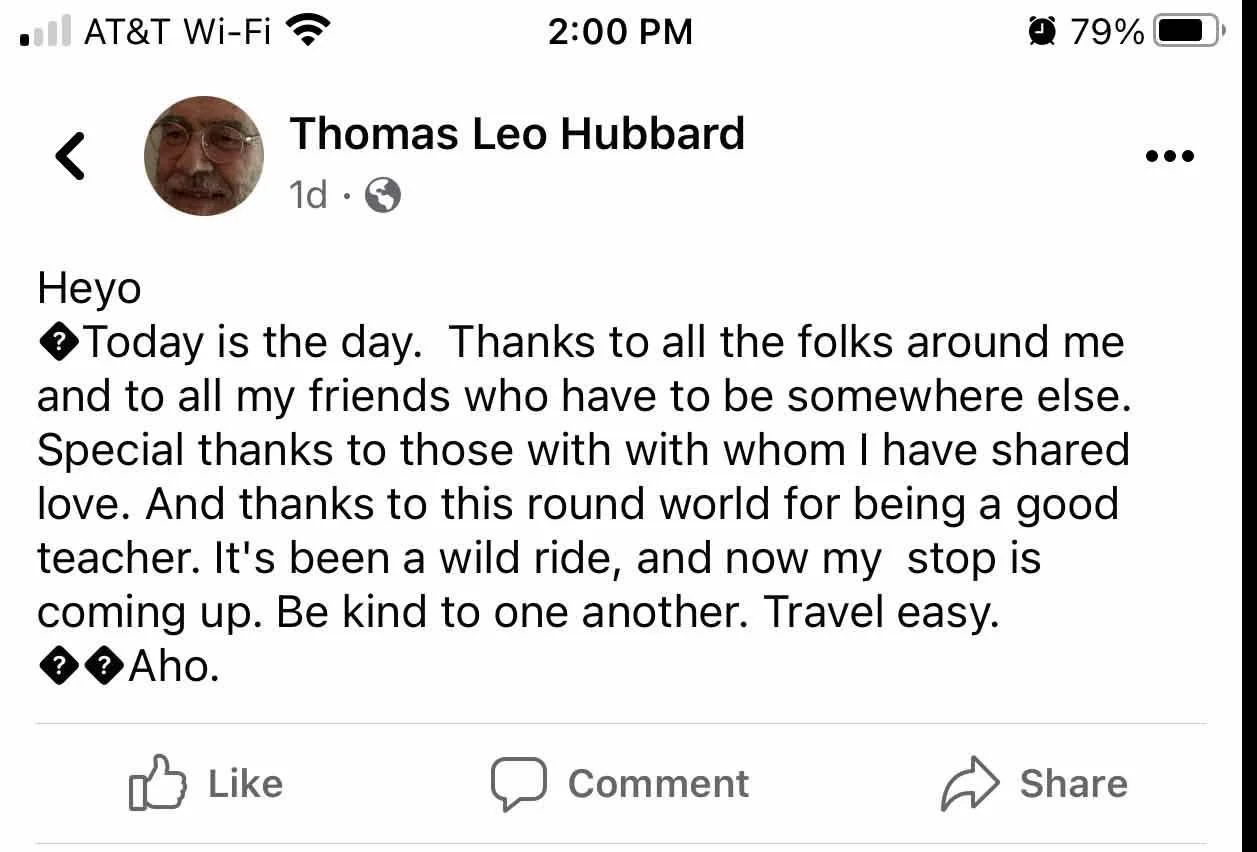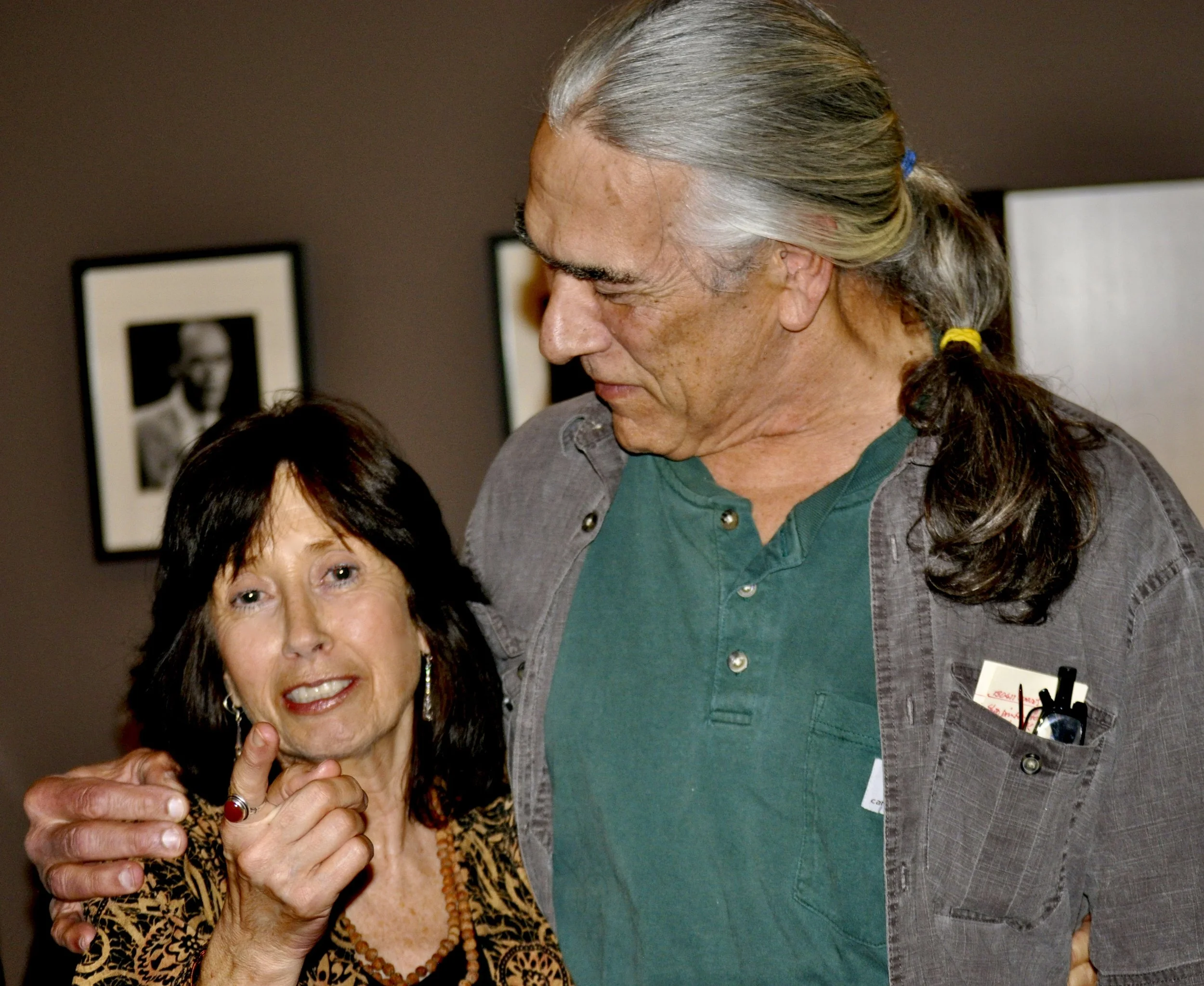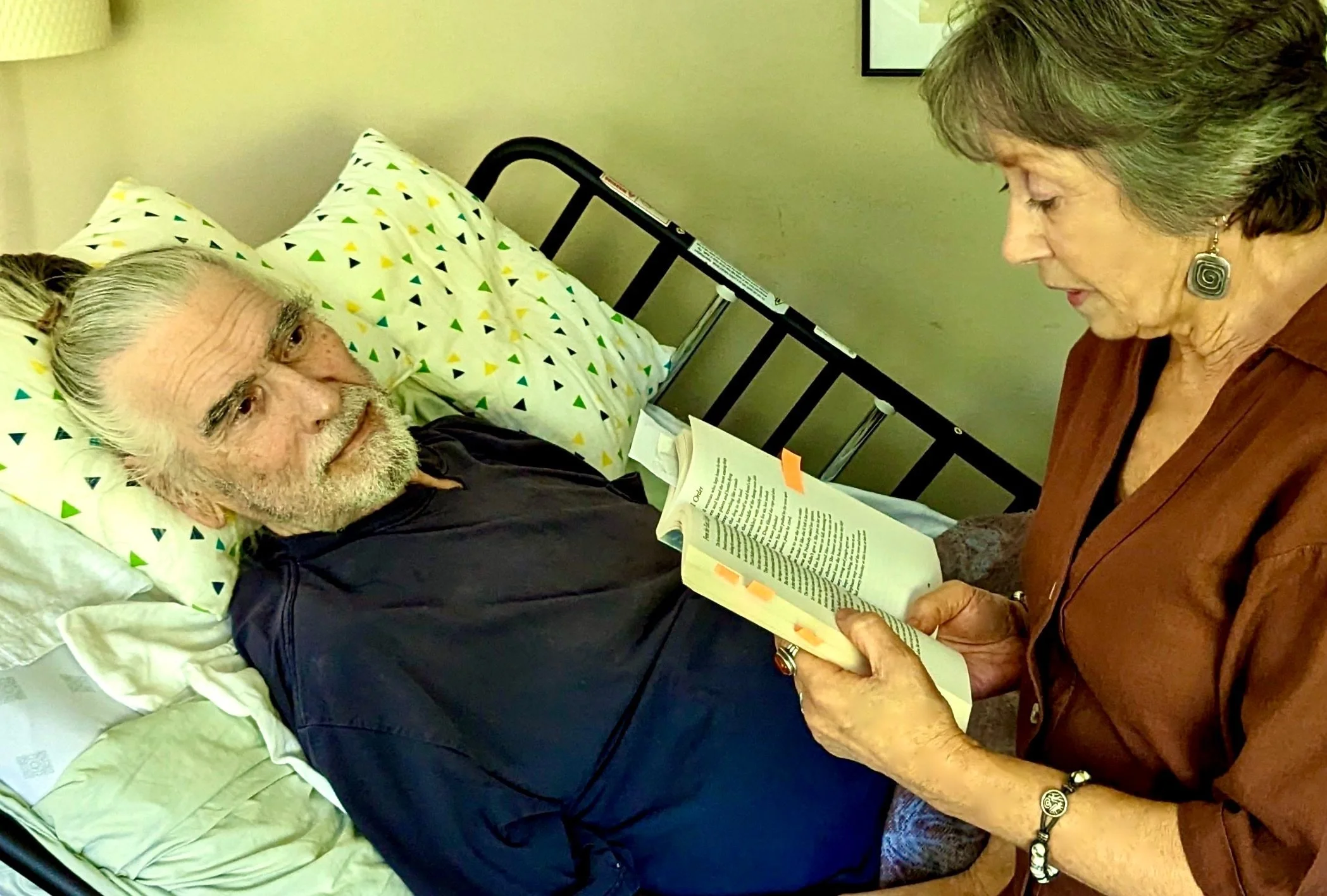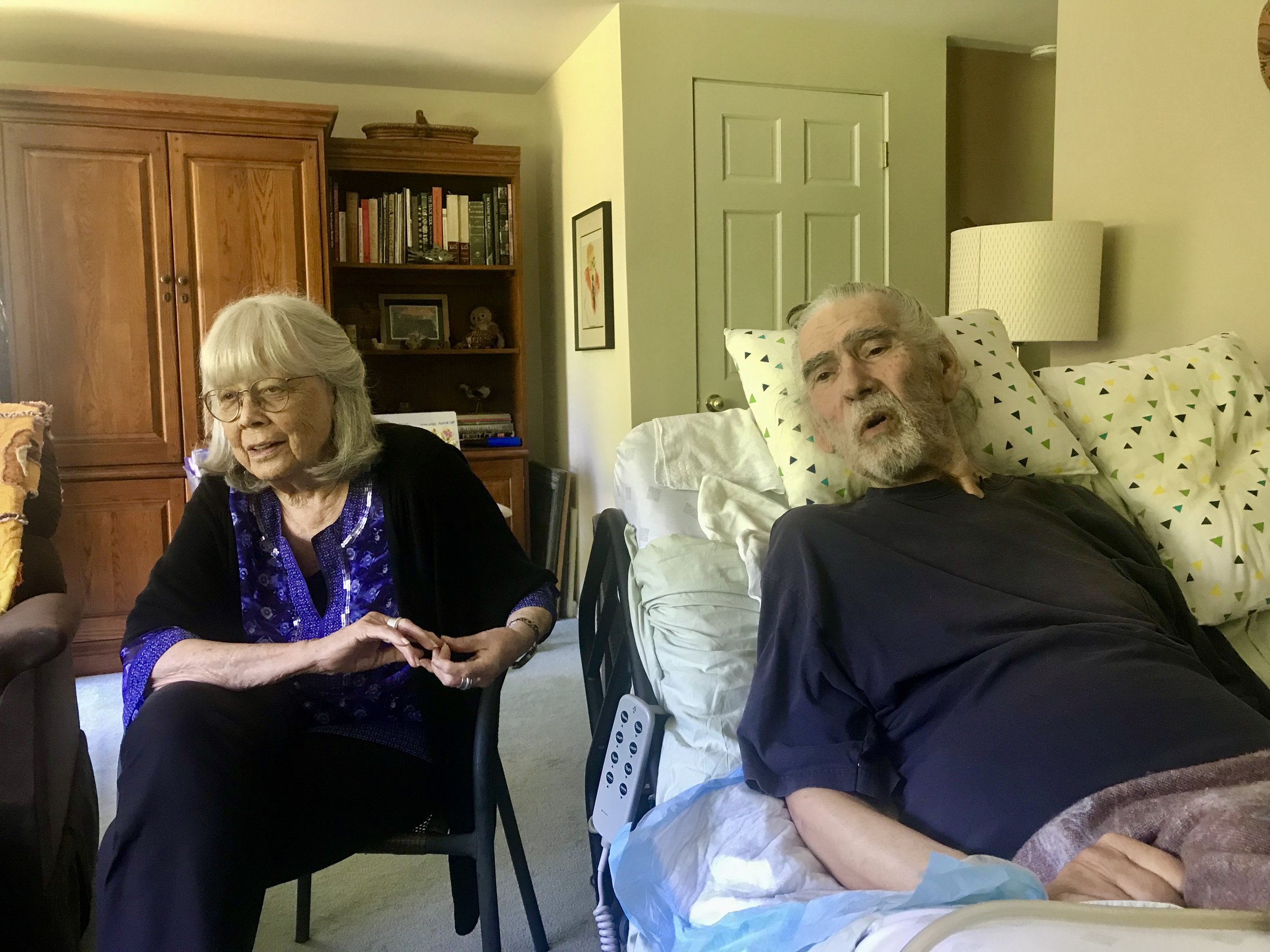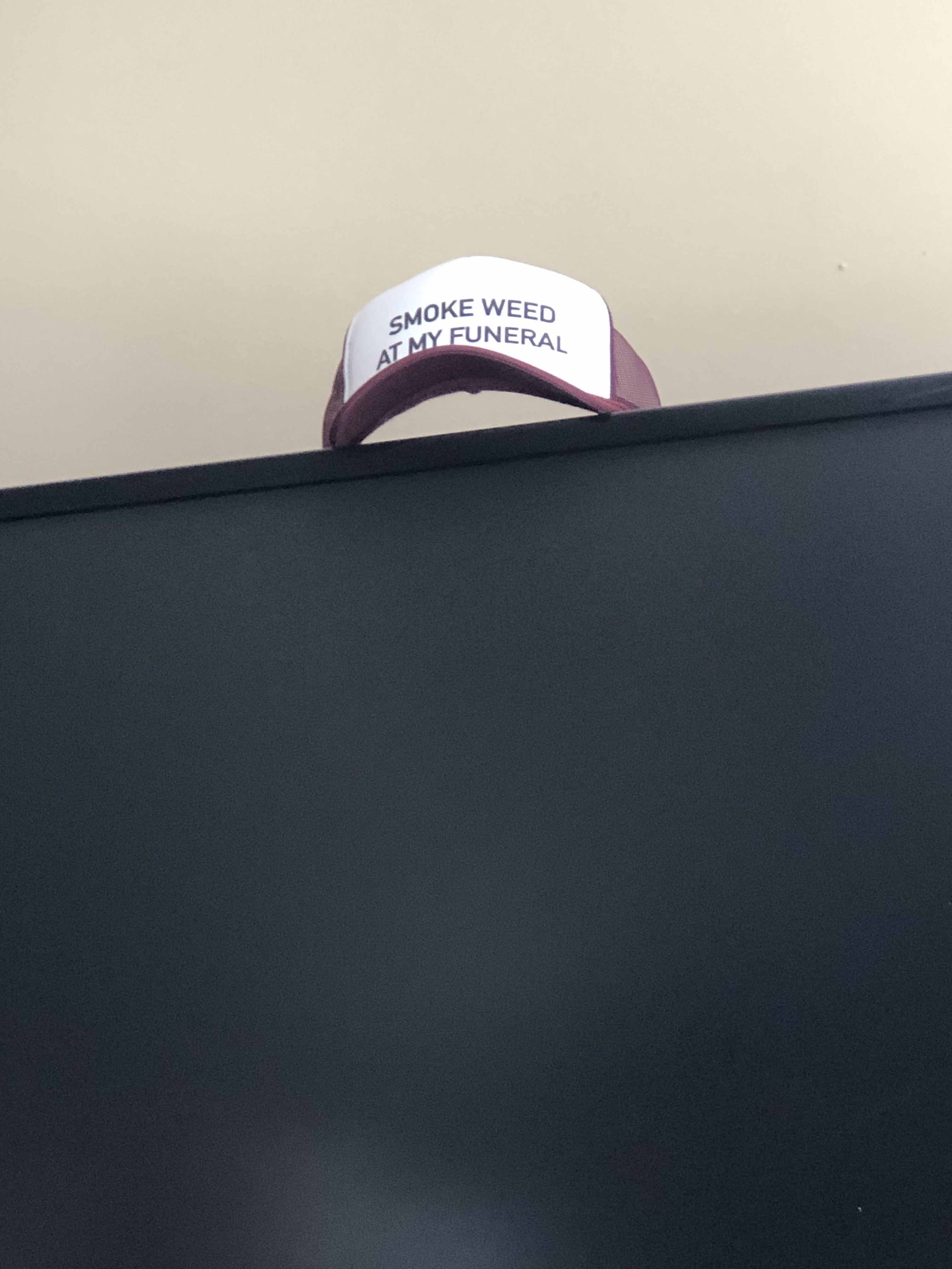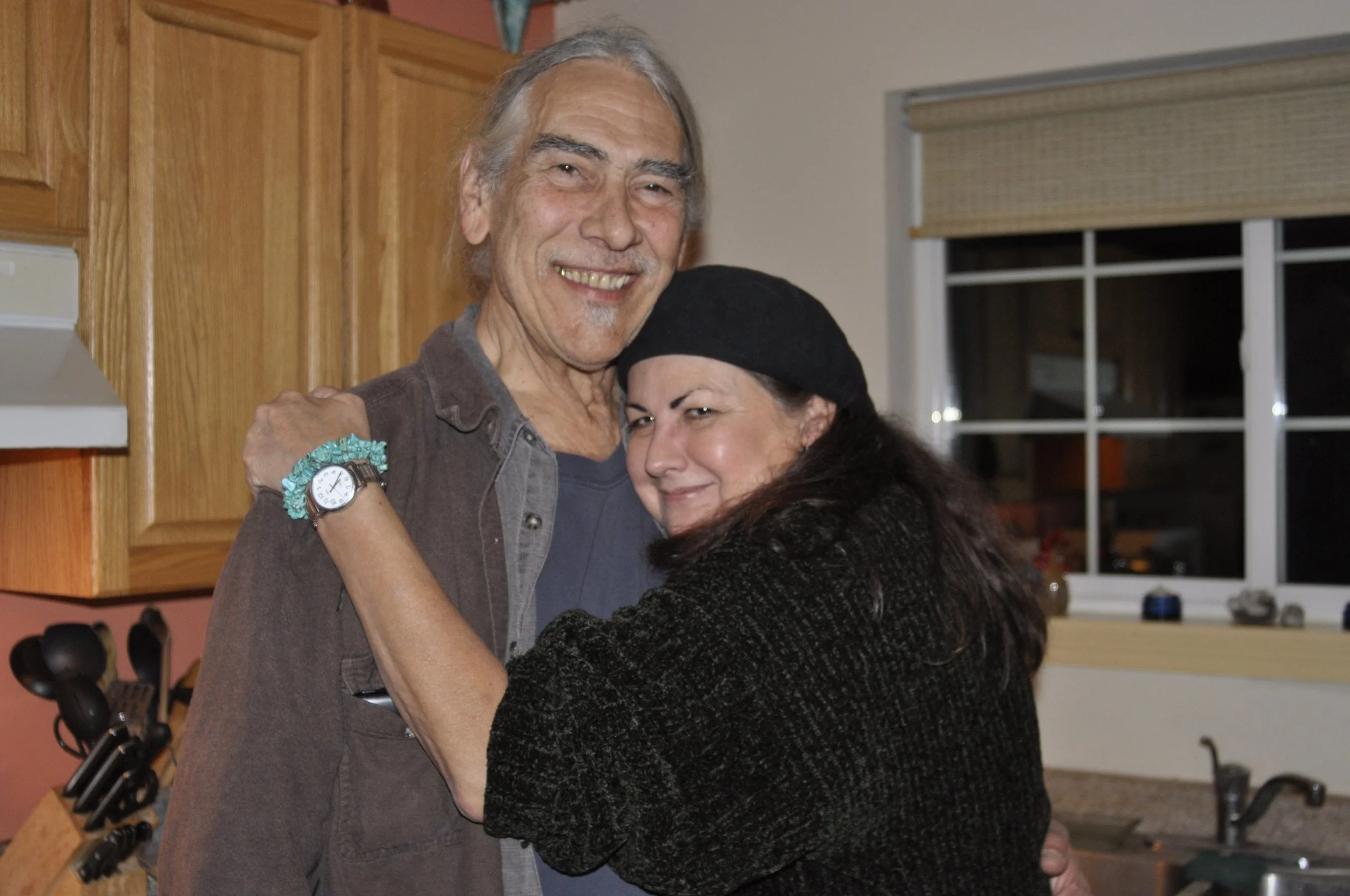Thomas Hubbard, June 15, 1938-May 30, 2023
Thomas worked as a contributing editor for Raven Chronicles Press for many years—he was a colleague, poet, strong reader of his own work and others, mentor, and, above all, a beloved friend. What follows are a few tributes to him, and memories of him, AND words from him: at the end and in between. His death is only part of his story, and the grace and courage with which he met it—make it part of all of our stories.
Thomas Hubbard’s last post on FaceBook to his friends, May 30, 2023.
Hey Thomas, old friend,
On days such as these, sunny and warm, the windows wide-open, it’s as if at any moment I’ll hear your old clunker of a car announcing your arrival from half a block away. Suddenly, there you are, in my kitchen again—tall, smiling, hair a little windblown, a dear friend bearing gifts, a loaf of your home baked bread or some berries; an offering given over with a “Heyo, Anna. Good to see you . . .” and a hug.
Anna Bálint & Thomas Hubbard
My sunlit-kitchen is once again ours for a while. A perfect place to plunge once more into conversation, exchange news and ideas, raise questions, examine different points of view—as if there’d been no interruption from wherever we left off the last time we talked. Sure, the topics change, but given that ours is a friendship defined, sustained, and nurtured by conversation, we readily slip into discussing whatever topic presents itself, which today—given the suggestive influences of all kitchens—means food talk. The pros and cons of almond milk, digestive issues, world hunger, and the well-being of our planet—all while we’re busily peeling, chopping, shredding, mixing, and, eventually, tossing a delicious and soon-to-be-eaten salad. Add a pinch or two more of pepper, another quick squeeze of lemon, and mmm . . . take a taste of that . . . .
But if we’re not in my kitchen, then we meet in a coffee shop. A place with good coffee, an empty table, no interruptions due to friendly dogs or lively grandsons, and a noise level conducive to an ever flowing, ever changing river of words, our river of poems shared and stories told, our river of seemingly endless and circuitous discussions of philosophy, history, and matters of the spirit. Our very own river of conversations needing to carve its way through the treacherous terrain of colonialism and capitalism and flow resolutely on, always in the direction of liberation. A river that sometimes meanders and at other times hurries through our personal pasts: the complications of our mixed identities; our shared experience of teaching at risk kids and finding ways to reach them; the ruthless legacy of trauma inherited by my grandsons and your son with his seemingly endless struggle with alcohol—whereupon you suddenly slap the table—hard enough to slop our coffee as well as change our direction by shouting, “Hey, but I’ve been lucky all my life”—loud enough to turn heads and remind me of the necessity, joy, and magic of music. How it always starts with the heart. Heartbeat to drum beat to birdsong to river-song.
Our river now skipping, slipping lightly over stones, singing its own song of survival through the fifteen plus years of our friendship. A river that at times becomes swollen with lofty ideas or misguided notions, yet never spills over its banks; a river that slows but doesn’t stop during your years of illness; a river that continues on to the day of your death, when, having finally run its course, it does as all rivers do at journey’s end—it empties itself into a sea; our river a river no more, but an eager relinquishing of self to saltwater, becoming part of that never-ending, always shifting, always restless, ancient and newly-born, mystery of ocean.
—Anna Bálint
Eulogy for a Poet
Thomas Leo Hubbard, 1938-2023
We’d rest our eyes on his tarnished brow,
float our ears on his talk’s tide, lie down
on his wanderings’ truck bed and doze
bumping along the back roads he drove
Ozarks to Mexico—we’d drift
to his breath’s fresh bouquet of drip coffee
and cannabis smoke, safely helpless
under those thin cirrus gust-ribbons
he seemed to bring with him, the sky
stirred, we’d believe, by that whip of his
tongue trained to humble tale-telling,
to waking the heat lightning under our skin.
You’d let his eyes settle on your pale hide
and listen as his lips undid your cinches.
You’d let him dig in, big hands on arms
like old wisteria limbs, you’d laugh
with him while he troweled your whiteness
to fertile dark, and he’d plant yams
in your chest. All this before the weakness,
when it was just a lead shoulder, just glass
crashing like surf in that ceaseless factory
in the shells of his ears. After
the damn neuron disease had had a few
years in him, still, his larynx rang
rooms like tower bells. Long deep notes
washed over us like oceanic plains winds.
We’d be his horses rearing, ready
to storm in his war for the Earth. But no,
he’s forged a new story. A nomad walks by
in beat-up clothes. Where we sleep and eat
his grandparents lived. Word by word,
a tent village rises through our ribs.
—Jed Myers
June 1, 2023
Scott Martin, Paul Hunter, Phoebe Bosché, Sheryl Sirotnik, Thomas Hubbard
To Laugh At a Funeral
for Thomas Hubbard
It may be in bad taste to laugh
at a funeral unless somebody
can't help but stand to tell one
of the dead man's best jokes
or painfully honest stories
and how else do we tell if
it's any good but by the laugh
it brings down like cold rain
over New Years' hot wet kisses
tasting of cheap flat champagne
this late to the party who minds
who else is allowed to have fun
at funerals besides the departed
who can't stand up for himself
yet has the head seat at the party
knows all the punch-lines that
some still polite can't deliver
but will get around to soon as
they start to miss the old rascal
with his silly breathless departures
and heartless bad timing to choose
these white hot nights and frosty
dark mornings to disappear
with a bald flat for a spare
and no destination in mind
—Paul Hunter
Tableau in Thomas’s room, photo by Danna Schmidt
LAST CALL
When time bends around the corner
to my final hours, let me choose
how I sing for my last supper.
Let my platter include kin of my Peoples,
the Chinook salmon, who knows
all about the cycles of life and death
and what it means to swim
upstream with a bone-weariness
born of sacrifice.
Let my chosen May day be sunny
and my morning coffee strong.
Open the drapes so I can
feast upon the garden’s bounty.
Sometime around 11:00 am,
let me raise a glass of Michter’s straight rye
whiskey with my bonus sons as a toast
to my own good consciousness.
Be assured I’m holding the promise that
it's always past five where I’m headed.
My words and my small
ink portraitures that line the dresser?
Those you can keep. I won’t need
chapbooks and chapped faces where I’m going
(or I don’t suppose so).
But if someone hands me a pen, paper,
and a Grand Slam mic at the doorway
from this place to that other one,
you can bet I’ll be showing the
fine folks on the flip side of the curtain
how it’s done.
Is this thing on? I’ll say with a smile,
It better be. Because no matter
which land is your land,
know that I’m still speaking and
always will be.
And when my last hour comes for me,
gather my people close.
Lend me the courage to see
their tears and hear their
whispered letters of love
and lament.
Allow my farewell Facebook post
—to my elsewhere clan, my dearhearts,
and to you, 𝘳𝘰𝘶𝘯d 𝘸𝘰𝘳𝘭𝘥, Great Mother,
my single, finest teacher—
to hold my gratitude and astonishment
for the whole grand journey.
Trust that I’ll hold each of
you to these slender directives:
Be kind to one another.
Travel easy.
And let it be rumored that
I was sweet and salty to the bitter end.
When Our Lady of Lethal Apothecaries asks
me if it’s okay if she mixes me
one last drink, and I say,
Well, whadya think we’re
all gathered here for?!! . . .
let it be known that even
from my deathbed, I’m
still cutting through the bullshit
and demanding the orange popsicle
just as promised.
And when they tell of this day,
let them remember how my heart
kept beating steady, like a distant drum,
and how my breath was as unwavering
as the fair winds of the Salish Sea
for one hundred and sixty-one minutes,
until the faint cries of the raven
lulled me to that most dignified hush
in my sloop, reposed as I was
for the voyage ahead.
And finally, let it be noted how
I spent my final breaths
during Life’s Last Call
on a three-word elegiac poem,
as I shouted,
Ahoy! Aho! and finally,
Ah! to the far horizon,
where the only thing I could see
was a giant clock paused at 2:55 pm
and the shining reflection
of my own inscrutable face,
peaceful at long last.
—Danna D. Schmidt
Master Life-Cycle Celebrant
& ADEC Certified Thanatologist
Photo by Sheryl Sirotnik
Thomas Hubbard, May, 30, 2023
Thomas Hubbard
Thomas & Anna Bálint
Sheryl & Thomas
Thomas’s ink portraitures
A last drink together, Scott, Paul, Phoebe, Sheryl, Thomas.
A Hat for Thomas. . .
This FaceBook post was sent to Victory Lee Schouten from Thomas Hubbard, in August 2018:
“Read your poem, which appeared this morning a few hours after I woke before daylight and wrote this:
“Comes a time when you realize you’re gonna die, and it’s ok but you want it to be dignified, and as you get closer, that becomes more urgent, that wanting for it to be dignified, that wanting to not lose what seems to be your last possession, your dignity…. You hope to not be pitiful.
“A long time ago when the sun shone golden and the world smiled, fresh as early love, when everything worked and anything that didn’t was easily fixable, way back when muscles of invincibility slid smoothly over one another, lifting and moving without much effort, that luminescent time rides along in the back seat, even moving into the shotgun seat occasionally on my long trips across the land, and in pre-dawn conversation along the open road, that beautiful time reminds me once again of all the people who walk and talk in my memory, citizens in the private nation that is my past.
“Sometimes when you wake too early to rise but too late for more sleep, a while before the freeway begins to sing, before the trash-man tosses back the last of his coffee and leaves for the garage, where he’ll climb into the big truck and start it up, a while before the street-sweeper makes his first pass through your neighborhood, sometimes during that magic, lonesome time of an early morning, you feel the decline, the reluctance of your body as you push it into the day’s efforts, and you realize, the youth you’ve lost is not coming back, but moving farther away and pulling your very life-force with it.
“And you’re quietly amazed at how easy it is, accepting what comes to us all, what comes, eventually, even to the world that made us, and perhaps you can’t help but smile just a bit at the prospect of no more responsibilities, knowing everything and everybody will get by just fine, with maybe just a tinge of passing sadness when you leave for good.
“That’s when reassurance comes once again to you, that regardless how you’ve fallen apart or been knocked apart by that paperless, endless magazine we call “life,” and regardless how desperately you may try holding on when it’s already too late, you have done the best, the absolute best you could have done under the circumstances given you. Because always, in every moment, in every life… everything that can happen, happens.”
—Thomas Hubbard
August, 2018
Sheryl & Thomas
Scott & Thomas
Thomas & Phoebe
Thomas & Lenora Good
Thomas Hubbard: a mixed-blood descendant of Cherokee, Irish, Miami and English ancestry, Hubbard grew up among factory workers and went to work in a glass factory, making bottles and jars. After six years in factories around the country, hitch-hiking for months on end during layoffs, he quit the trade and earned a teaching degree in English and Sociology, graduating Ball State University, Muncie, Indiana, in 1969. Because of his anti-war involvement with SDS and underground newspapers, he was employable only in very needy schools. His teaching career began in Gary, Indiana. Over the next thirty years he was in and out of teaching mostly in ghetto schools, working also as a carpenter, blues musician, and freelance writer, and attended various graduate schools. During these years he fathered four sons. He arrived in Seattle in 1991, newly-divorced and broke.
After his father’s death in 1994, Hubbard began a memorial project. Over the next five years he compiled, edited and, in 2000, published Children Remember Their Fathers, an anthology of works by performance poets from around the country. Many of the poems in the anthology were gathered from slam poets during his appearance at the National Poetry Slam in Ann Arbor, Michigan, in 1995, as winner of the Seattle Grand Slam. Two years later, Hubbard retired from teaching written expression in Tulalip Reservation’s Heritage School to focus on his Gazoobi Tales imprint—publishing works of merit that might not get a reading elsewhere. Hubbard authored Nail and other hardworking poems, Year of the Dragon Press, 1994; Junkyard Dogz (also available on audio CD); and Injunz, a chapbook. His book reviews have appeared in Square Lake, Raven Chronicles, New Pages and The Cartier Street Review. Publication credits include poems in Yellow Medicine Review, I Was Indian, editor Susan Deer Cloud (Foothills Publishing, 2010), and Florida Review; and short stories in Red Ink, Raven Chronicles and Yellow Medicine Review.
